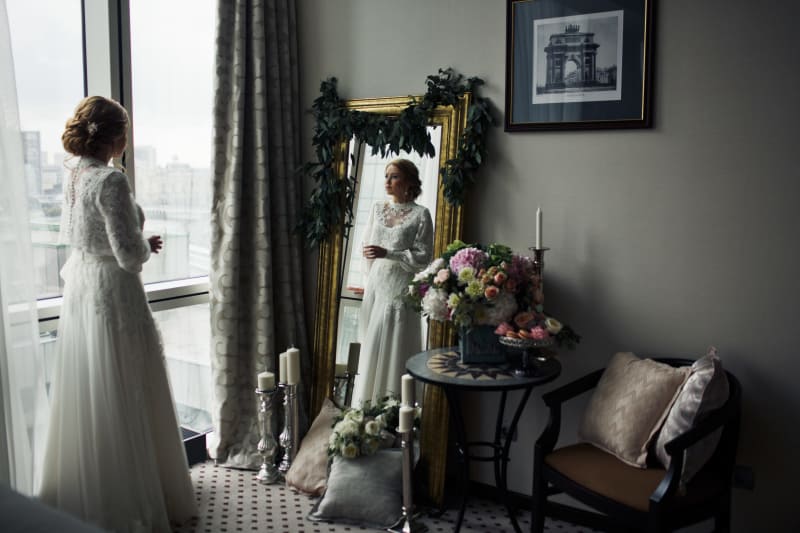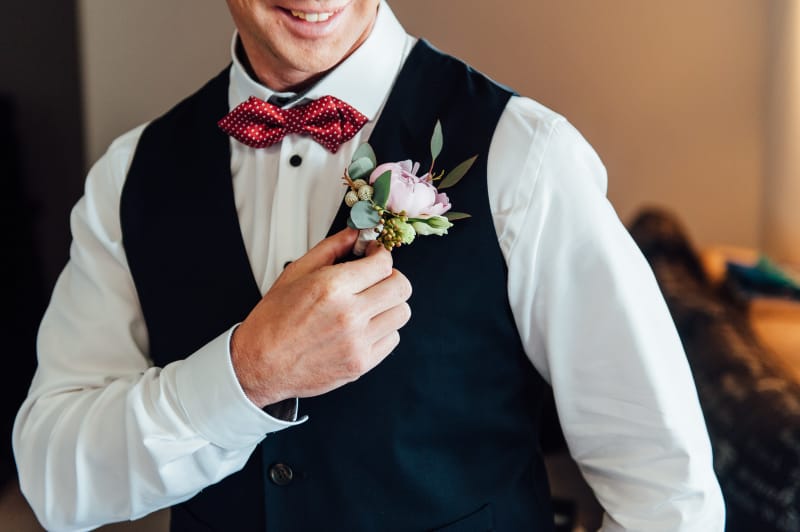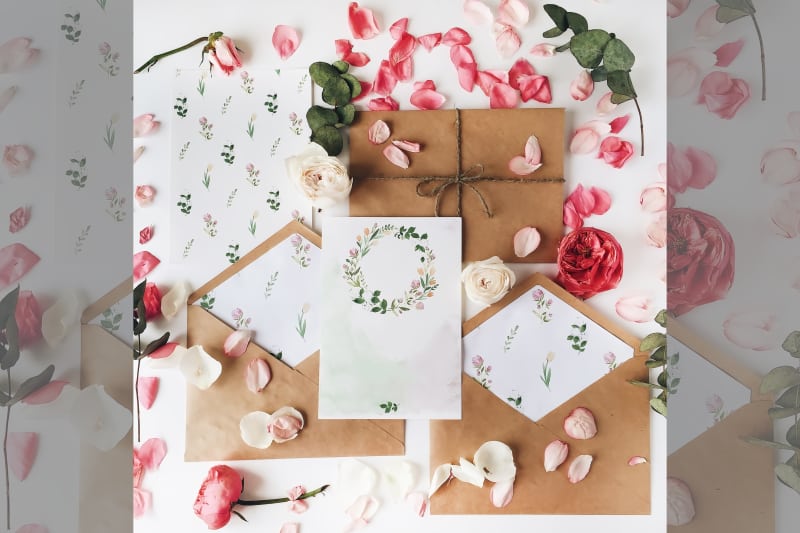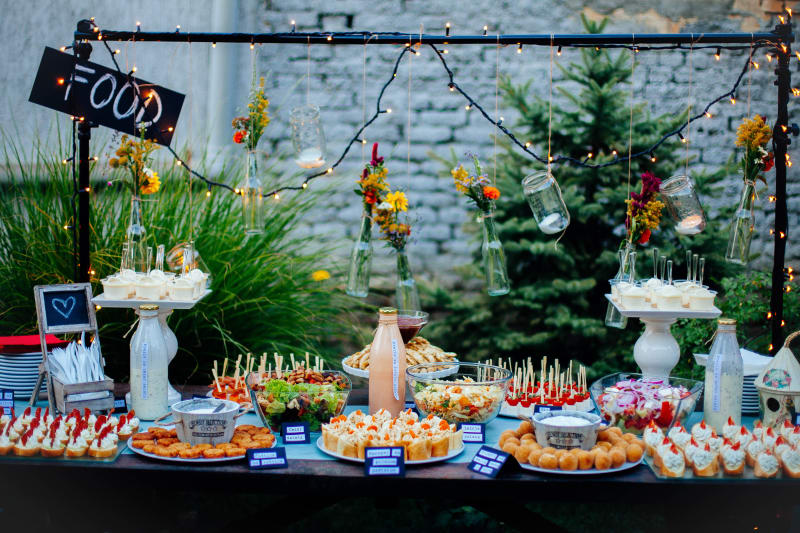
Weekends and Saturdays are the most popular choice for weddings and the dates can be booked up a year in advance!
2. How many guests can this venue accommodate?
Your guest list will hugely depend on the size of your venue, for example if your venue can accommodate 300 people, it won’t matter so much if a few of your 200 guests bring a plus one.
3. Would it be possible to have our wedding ceremony at this venue? Which rooms could we use for this purpose?
Having your ceremony and reception at the same location can be a HUGE money-saver, as you can use the same flowers and decorations and you won’t need transport!
4. How long do we have the use of the venue for? Is there a set ending time? Can we extend?
Venues located in densely populated areas will often have a curfew and sound limitations, so you will want to know about this ahead of time in order to make contingency plans!
5. Will you be hosting any other weddings at the same time as ours?
If you are planning on having your wedding in a hotel, it is possible that there might be other weddings happening at the same time. While there isn’t much you can do about this, it is always better knowing ahead of time!
6. What time would we be able to start setting up for the wedding?
The day before or early in the morning of the same day are the usual options for set-up, but you want to know the exact times so you can communicate these to your other vendors.
7. What are the guidelines for decorations?
Some venues will have limitations on the use of candles and confetti while others, like art galleries or museums might have restrictions on flash photography.
8. Are the tablecloths, chairs, cutlery and glasses provided or do we need to rent our own? Can we have a look at the available choices?
If you choose to get the tablecloths, napkins, etc that are provided by your venue, make sure to get this in writing, in case they decide to change their colour scheme and the final results clash with your wedding colours!
9. Do you have a list of preferred caterers? Can we see sample menus?
Sometimes a venue will have caterers it recommends, other times a venue will have caterers you must use. Either way, ask to see a list of their favourites, it might be helpful hiring someone who has worked at the venue before!
10. Can we bring our own alcohol? If so, what corkage do you charge?
Sometimes the corkage fees can be so much that it is cheaper to buy your venue’s drinks than providing your own.
11. Do you have the option of a paid bar? Would there be a specific amount that would have to be reached before the end of the reception?
You may want your guests to pay for their own drinks on your Wedding Day (and why not after all of your generous hospitality?!) If that is the case, make sure you ask the venue whether or not there is a minimum spend. This will save you from unexpected costs at the end of the day!
12. Can this venue accommodate a band or DJ, including all of their equipment? Are there enough electrical outputs for the music and the lighting?
An important enquiry to make if you are planning on having dancing after the wedding breakfast. You certainly don’t want to have booked and paid for a DJ and find out the venue will not accommodate him!
13. Do you have any special facilities for children?
If there is an extra room available for the kids, we definitely advise you to use it! Nothing entertains children more than having a few games or even a Disney movie on in the background, leaving the adults to enjoy the speeches and the dancing.
14. Do you have disabled access?
If anyone from your guest list is disabled it will be important to ask your venue whether there is access and toilets for them to use.
15. When do we need to pay our holding deposit? Are there any other fees we should know about? (Corkage, taxes, service charge)
Paying your deposit is important as it is often what secures your venue for the wedding date agreed. Make sure you enquire with your venue when this is due, to avoid any disappointment!
16. Would there be a venue coordinator available on the day?
If there is a venue coordinator available, we strongly advise you enlist their help! They will know how to provide you with a completely stress-free experience and that everything runs smoothly.
17. Is VAT included in the price?
You may have thought you found yourself a bargain and booked your chosen venue immediately. However, your invoice was much higher than expected because VAT was not included in the price you were quoted. To make sure this doesn’t happen, simply ask your venue if the price you are being quoted is VAT inclusive!
18. (If an outdoor wedding) What are the possible options in case of inclement weather?
If the venue has rooms that can be used for your ceremony, make sure to see them and imagine how the space could work for you.
19. Are fireworks allowed?
If you have dreamt about having a firework display at your wedding since you were little and your favourite venue on your shortlist doesn’t permit them, you are going to have a decision to make! If having fireworks are top of your priority list, then this should be the first thing you ask.
20. How would car-parking work on the day?
Will there be enough car parking spaces for all of your guests? Will there be someone to show your guests where to go from the car park? If you have friends and family living all over the country and know that lots of them will drive to your wedding, it is important they will have somewhere to park their car. Ask your venue car-parking questions to prevent Grandma from having to park her car a few miles from your reception!
21. Does your venue have liability insurance?
Of course you want your Wedding Day to run as smoothly as possible, but accidents happen! Make sure you ask your venue whether or not they cover any (unlikely) accidents that may occur on the day!
Wedding colours are usually one of the first foundations of wedding styling that you lock down, as they’re an important basis for your bookings in loads of other aspects of the wedding too – that’s why they’re so early on in our super useful wedding checklist! It’s the kind of detail that is incredibly easy to get caught up in (does it really MATTER if one of them is turquoise and one of them is baby blue?), but, counter-productively, it may feel like wedding colours need to be completely decided on beyond all doubt before you can move on to make any other detailed decisions. Fret not: we’ve compiled a list of things to think about in order to choose your wedding colours, and choose them right.
Where are you holding your wedding? That’s the first question you need to ask yourself when delving into the world of wedding colour palettes. If you want to go wild with very specific colours that mean something to you, or bolds and brights, use our venue search toolto search the largest wedding directory in the UK and find somewhere that can serve as a blank canvas for you to really make your own. Alternatively, if you’ve already got your eye on a venue that already has a certain style, think about the colours so that highlight and compliment the best features of your venue.
The Small Details
Finding a venue can be the cornerstone moment of wedding planning for some couples, for others, their favourite flowers, the wedding dress or the ultimate bridesmaid attire can be the deciding factors in choosing a colour scheme. So if you have certain must-haves, without which you can’t imagine your wedding, get those scribbled down.
Season
Draw inspiration from your chosen wedding season. Pastels can work well for winter, jewel tones will look fantastic in autumn, so feel free to experiment with textures and different shades!
The Mood
What kind of wedding do you want? If you’re after a feeling of luxury and drama, then go for darker and richer colours. If you are a fan of a romantic atmosphere, lighter shades will look perfect.
Your favourites
Look in your home and wardrobe for colour inspiration. The colours that dominate there are obviously the ones you love. Bonus: the wedding photos that will take their place on the mantelpiece will even match your home – now that’s planning!
Research
Keep your options open and look around before settling on a palette. Hit up Pinterest or our Real Weddings section for inspiration. While we don’t advise you to chase the latest trends and fashions, you can always throw in a hot new colour as an extra detail to your wedding.
Colour wheels
We’re going to get technical here so grab a colour wheel. The basic rules for colours are that cool and warm colours go well together, as do colours which have the same primary colour base. Within that, you can pick an analogous colour scheme, with three colours located next to each other on the colour wheel, or you can choose complementary colours, which sit directly opposite each other on a colour wheel. Alternatively, you can go for monochromatic colours, which are a number of different shades taken from the same hue.
Our general rule for choosing wedding colours is to have at least one neutral colour which your guests’ eyes can rest on to balance the bright colours in your palette. And there you go!
Every year, Pantone releases its “Colours Of The Year”, a list that attempts to predict the colours that will be everywhere in the coming year. The irony is that this list often decides what the predominant colours will be the next year, and thus what’s readily available from suppliers and shops. Do you remember 2016 being awash with a light, warm pink and cooler, forget-me-nottish blue? That was Rose Quartz and Serenity Blue. This year it’s the vibrant Greenery. They release them in December, so keep an eye out for them – if its a colour you like, your styling just got a whole lot easier.
Needless to say, when choosing wedding colours, choose shades that are easily wearable, especially if you want the bridesmaids to carry the majority of colour – and talk to you again!
Cake
Sneaky tip: don’t overdo the colour on your wedding cake. We suggest you use small details and occasional pops of colour to make it look epic.

Start planning early. Know your speech well enough so that by the time you stand up to deliver it, you only need to glance at your paper to remember what comes next. You don’t want to be ‘reading’ it, however well written the speech is.
and take your time. An average wedding speech is 8-10 minutes long. Day-to-day, you’ll be talking at about 220 words a minute. In your speech, aim for 120 and allow for pauses to breathe. It’s a good idea to write these into your script for maximum effect. It may feel like you’re delivering it at a snail’s pace, but your audience will be able to digest it much better.
The audience will be on your side and eager to hear what you are saying.
You do this in conversation, but it’s easy to forget in a ‘formal’ setting. If you’re telling people you’re “so happy”, make it clear – “I’m so happy!”
Try not to let nerves (or shaky hands) show. Adrenalin can be a positive and enhance your delivery.
Looking up will give you extra confidence and engage your audience.
Gesticulate to emphasise a point, don’t forget to smile, and if you are addressing someone, look at them.
Good posture can make you look and feel more in control. Stand tall, feet shoulder-width apart and project your voice.
Pause for applause and laughter, rather than continuing through it. Be prepared for hecklers by having some responses up your sleeve – even if it’s just an ironic “thanks for that…”.
It may be tempting, but getting drunk will not help you deliver a great speech… save the drinking for when the speeches are over and everyone’s toasting you!

• Wedding dress and the accessories that come with it
• Bridesmaids’ dresses and accessories (although nowadays more and more bridesmaids pay for their own attire)
• Bride’s accompanying outfits (going away and honeymoon)
• Hair and make-up, along with other beauty treatments
• Transportation for the bridal party to the ceremony
• Transportation for the bride and groom from the ceremony to the reception venue
• Photography and/or videography
• Flowers
• Venue hire and decorations
• Wedding cake
• Catering
• Favours
• Drinks
• Entertainment
• Wedding stationery
• Groom’s wedding ring
• Engagement party
• Wedding insurance
• Overnight accommodation for close family
• Presents for the groom’s family

• Groom’s outfit
• Best man’s and usher’s outfits (like bridesmaids, however, these now tend to be bought by the groomsmen themselves)
• Groom’s going-away outfit
• Transportation for the groom and best man to the ceremony
• Transportation for the bride and groom from the reception
• Buttonholes for all the groomsmen
• Civil or religious ceremony fees
• Church fees, plus extras like church music and bell ringing
• Registration office and other venue fees
• Passports and visas for the honeymoon
• Travel and accommodation for the honeymoon
• Spending money for the honeymoon
• Travel insurance for the honeymoon
• Bride’s engagement and wedding rings
• Presents for the bridesmaids, ushers and best man
• Presents for the bride’s parents
• Press announcement for the wedding
• Wedding night hotel
So, that’s how it’s been broken down historically, but the winds of time are a’changing and there’s nothing to say that this is how yours will or should be broken down. Couples are getting married later in life now than they used to, so financial situations are likely to be somewhat different. Whatever you and your beau decide, make sure you keep on top of it with our free wedding planning tools, and everything will be just fine!

1. If you are getting married in a church, remember, that you will have to pay extra for an organist, a bell ringer or a choir.
2. An off-site civil ceremony will cost more than a ceremony at a registry office.
3. Wedding dress prices often don’t include any potential alterations (and the bride usually needs approximately three fittings!)
4. Don’t forget any delivery costs. Some florists, cake makers, etc. will charge a fee when delivering from a certain distance.
5. Check if envelopes are included in the price of your stationery (can you believe that sometimes they aren’t?!)
6. Consider stamps! Depending on the weight of your invitations and on how far they will have to travel, stamps can add up!

7. It is a good idea to think about some food for when you and your bridesmaids/groomsmen are getting ready, even if just a platter of sandwiches you could make up the day before. Alcohol and hunger do not go well together.
8. If you want to relocate your flowers from the ceremony venue to the reception venue, your florist may charge you a fee for the extra work.
9. If you are filming your wedding, some musicians may charge a fee for their performance to be filmed – so ask in advance.
10. Make sure your venue (or caterer) includes the service charge in the bill. It can be an unpleasant surprise to have another 12.5% added to your bill at the last minute.

11. Provide nourishment for your wedding team: photographer, videographer, entertainer, band or DJ. They won’t be expecting the same meal as your guests necessarily but check their contracts, as some do stipulate hot meals.
12. Definitely don’t forget about corkage fees. Even if you found alcohol on a massive bargain, it may not make a difference when you consider how much the venue will charge you for serving it.
13. If you are having a marquee, make sure you take out insurance that will cover any potential damage.
14. How are you getting to the church, to the party and where you are staying after? If you need a car, tractor or horse, factor that in.
15. Don’t forget about VAT. Read the small print to avoid any surprises.
16. Budget in any post-wedding spending, for example, dry cleaning the wedding dress, thank you notes, etc.
At the root of it all, make sure you note everything down somewhere and make arrangements that are clear to both parties for everything, to avoid any nasty surprises. That way, you’re on top of it – so don’t worry!

